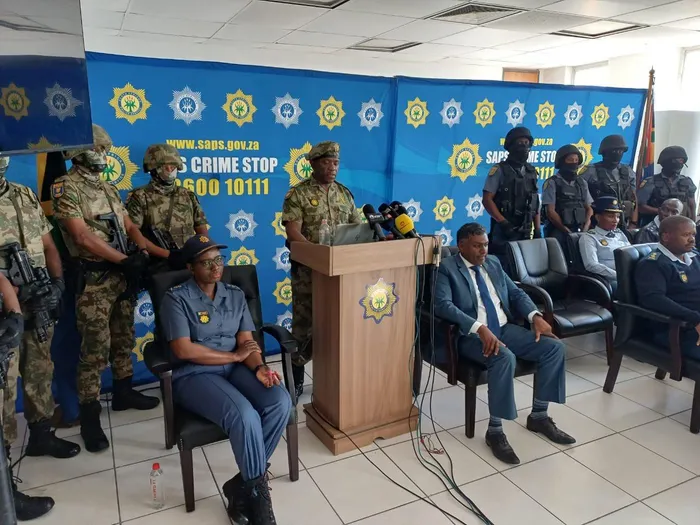'Combat mode means business’: Mbalula defends Mkhwanazi's Special Task Force regalia amid criticism

ANC secretary general Fikile Mbalula backs STF presence, defending combat uniforms as symbolic of a serious crime-fighting stance, amid fallout from Lt Gen Nhlanhla Mkhwanazi’s explosive claims of interference in high-profile KZN investigations.
Image: SAPS
ANC secretary general Fikile Mbalula has publicly defended the police’s use of Special Task Force camouflage uniforms and heavy arms, commonly known as “combat mode,” following revelations made by Lieutenant General Nhlanhla Mkhwanazi at a press conference in Durban on Sunday.
Mkhwanazi’s striking appearance, dressed in full combat uniform and flanked by heavily armed officers, along with his bold declarations, sparked widespread public debate.
“I am combat-ready. I will die for this badge. I will not back down,” Mkhwanazi declared at the briefing.
The controversy stems from a growing fallout between Mkhwanazi and Police Minister Senzo Mchunu, following the contentious disbandment of the KwaZulu-Natal (KZN) political killings task team, a unit that had been investigating high-profile assassinations in the province/
Mkhwanazi claimed the task team was disbanded without his consultation and hinted at political interference from individuals close to Minister Mchunu. He also alleged connections between an associate of the minister and the criminal underworld, based on cellphone analysis.
Reinforcing his claims, Mkhwanazi revealed that 121 case dockets were unexpectedly removed from the task team in March and subsequently shelved at police headquarters in Pretoria. He made these statements while in Special Task Force (STF) combat uniform, standing alongside officers from the STF and Tactical Response Team (TRT).
Speaking at a media briefing on Monday, Mbalula confirmed that the task team had indeed been disbanded over six months ago, with the reasons publicly communicated at the time, and no immediate concerns raised until the recent press conference.
“As part of the package of what was said yesterday, these will belong to the issues that will have to be investigated, to be tested one way or another in terms of their veracity,” he said.
He emphasised the need for a proper investigation into new claims.
Moreover, Mbalula clarified that the police’s combat-style uniform is specifically that of the STF and should not be confused with military attire.
“Commissioner Mkwanazi is a former Special Forces policeman, high rank. The camouflage you saw yesterday is the camouflage of the Special Forces, and they carry heavy arms. And police do appear in different regalia. That is their uniform too,” Mbalula explained.
He added that police uniforms vary depending on the unit and role, noting that even former police generals have worn such camouflage when needed, citing former Minister Bheki Cele, who, when he was a General of Police, alternated between TRT and the STF camouflage uniform.
“The Special Task Force (STF) is a highly specialised unit whose members are responsible for only responding to high-risk incidents, which include hostage incidents, search and rescue missions, as well as specialised operations support,'' said Police spokesperson Brigadier Athlenda Mathe
The Special Task Force members stand out from the rest of the police units as they wear camouflage uniforms, she said.
Mbalula stressed that the choice of this particular uniform was deliberate and symbolic. “In the fight against crime, the combat mode means fighting dangerous criminals. That is combative, meaning we’re putting our foot down,” he said.
“That appearance seeks to signify that we mean business.” He acknowledged that some people have questioned this approach but underscored that it is a police uniform, not military, and was part of a message to the public and criminals alike.
Mbalula also addressed a broader debate about the militarisation of the police force, recalling how ranks were changed from traditional police titles such as superintendents and commissioners to army-style ranks.
“We passed that. The police are commissioners, they were superintendents. We changed that. I was part of the team that changed police from superintendents to commissioners and brought in army ranks. We were fairly criticised by human rights groups,” Mbalula said.
The rationale was that crime had escalated, with criminals openly carrying military-style weapons and terrorising communities, requiring a more serious, militarised police response.
Beyond uniform and ranks, Mbalula expressed “grave concern” over troubling revelations made by a police general at the press conference about syndicates and corruption within the police. He described these disclosures as “disparaging” and bordering on lawlessness, saying they “make us look like a banana republic.”
“If people say that there are syndicates in the police, there are problems, and there are senior management service officials, those are disparaging. As a citizen, first before I’m a member of the ANC, I must be worried,” Mbalula said.
He emphasised that such matters require urgent and serious attention and noted that President Ramaphosa has committed to tackling these issues.
“The centre must hold. We are not a banana republic,'' said Mbalula.
hope.ntanzi@iol.co.za
Get your news on the go, click here to join the IOL News WhatsApp channel
IOL Politics
Related Topics: